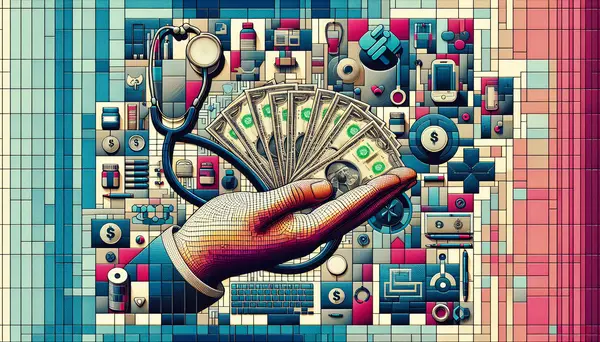Table of Contents:
Introduction: Embracing Blockchain Beyond Cryptocurrencies
The groundbreaking technology of blockchain has been primarily linked with cryptocurrencies, with Bitcoin being the showstopper. However, blockchain's potential reaches far beyond the realm of digital money. It serves as the bedrock for a decentralized and secure structure that can revolutionize multiple sectors, most notably healthcare and finance.
In simple terms, a blockchain is a shared, immutable ledger that records a history of transactions. Each transaction added is a 'block' connected in a 'chain' of preceding entries. This transparency and unalterability bring a new level of trust and efficiency previously unseen.
The Best Mining Providers at a Glance
» Infinity HashFrom our perspective, currently the best mining provider on the market. With the community concept, you participate in a mining pool completely managed by professionals. A portion of the earnings are used for expansion and maintenance. We've never seen this solved as cleanly anywhere else.
» Hashing24A well-known and established cloud hosting company. With a good entry point and in a good market phase, a good ROI can also be generated with some patience. Unfortunately, we see the durations as a major drawback.
In this article, we will explore bitcoin's underpinning technology, blockchain, and it's applicability in healthcare, finance, and other sectors. This piece presents a comprehensive guide for beginners looking to understand how blockchain is leaving its indelible mark outside of its birthplace – the world of cryptocurrencies.
Blockchain in Healthcare: A Revolution in Patient Data
Imagine a world where every patient’s data is securely, yet readily accessible for health professionals anywhere, anytime. That’s the potentiality offered by the marriage of healthcare and blockchain.
The healthcare industry is grappling with vast amounts of scattered patient data, often leading to inefficiencies and errors. Integration of blockchain technology promises a solution by ensuring secure sharing and synchronization of this data across health networks.
Every patient can have an individual blockchain that records a secure, permanent history of health conditions, treatments, and test results. This transparency fosters a new level of communication and cooperation among doctors, leading to more precise diagnoses and personalized treatments.
Moreover, the immutable nature of blockchain secures the data against tampering. Such a feature is significant when dealing with sensitive health information, protecting patient privacy, and preventing fraudulent instances. Indeed, the application of blockchain in healthcare is a revolution in patient data.
Pros and Cons of Blockchain in Different Sectors
| Sector | Pros | Cons |
|---|---|---|
| Healthcare | Enhanced security, interoperability, data integrity, patient care | Complexity of implementation, scalability issues, potential privacy issues |
| Finance | Increased transparency, reduced fraud, efficiency in transactions | Regulation and compliance issues, acceptance by traditional banks, high power consumption |
| More (General) | Decentralization, proof of work, smart contracts | Still emerging technology, discovery of more weaknesses, slow transaction speed |
Improving Financial Services with Blockchain Technology
blockchain-technology-1692089350.webp" alt="Improving Financial Services with Blockchain Technology">
The financial industry is no stranger to disruption, and blockchain is the latest entrant. As an incorruptible digital ledger of transactions, blockchain offers enhanced security, efficiency, and transparency, transforming how we handle money and conduct business.
Blockchain brings a new kind of financial services infrastructure. With its decentralized nature, blockchain negates the need for intermediaries like banks or brokers in financial transactions. Consequently, transactions can be faster, cheaper, and more accessible to people around the globe, even to those without access to traditional banking.
Moreover, blockchain's traceability feature offers unprecedented transparency for transactions, essential in areas like auditing and regulatory compliance. By providing an immutable and publicly viewable ledger of transactions, blockchain ensures full accountability and reduces the risk of fraud.
Additionally, blockchain can facilitate secure, immediate cross-border payments, overcoming the typical delays experienced in our current banking setup. The advent of "smart contracts", a product of blockchain technology, promises a paradigm shift in contractual transactions by automatically enforcing the stipulated terms once conditions are met.
Thus, the adoption of blockchain technology in finance can lead to streamlined processes, reduced costs, and enhanced consumer trust making it a game-changer in the financial services landscape.
Expanding The Scope of Blockchain: Fresh Possibilities
While healthcare and finance are notable proponents, the functional range of blockchain is expansive and extends into various other sectors too. Blockchains unique features of decentralization, immutability, transparency, and security present considerable potential in industries like supply-chain management, real estate, voting systems, and more.
In supply-chain management, for instance, the transparency of the blockchain can provide a real-time, unalterable record of a product’s journey from factory to customer. This traceability feature can enhance the efficiency of the supply chain, authenticate product quality, and help tackle issues like counterfeiting.
On the other hand, the real estate sector stands to gain from the advent of 'smart contracts.', a feature offered by blockchain. These programmable contracts can automate real estate transactions, ensuring they are seamless, secure, and devoid of heavy paperwork.
Furthermore, in terms of voting systems, blockchain can enhance the speed, security, transparency, and reliability of public elections. Voting can be done digitally while maintaining anonymity and ensuring that the votes, once recorded in the blockchain, are tamper-proof.
The examples mentioned serve as just a glimpse of how blockchains practical utility is transcending traditional boundaries. Its potential for broad-spectrum impact is still being unearthed, promising a new era of digital transformation across various landscapes.
Conclusion: Why Blockchain Matters in Multiple Sectors

In essence, blockchain's success extends beyond cryptocurrencies. The advantages it offers - decentralization, transparency, immutability, and security - can greatly benefit numerous sectors.
In healthcare, its potential to revolutionize the management of patient data is beyond impressive. Secure and transparent records can facilitate more effective communication and cooperation among medical professionals.
Finance, another crucial sector, is experiencing a paradigm shift with blockchain technology's advent. From faster transactions and better audit trails to the promise of disruption with smart contracts, blockchain's role here is significant.
And it's not just healthcare and finance. Be it supply chain management, real estate, voting systems, or several other sectors, blockchain presents fresh possibilities that can redefine established practices.
In conclusion, blockchain signifies more than just cryptocurrencies - it's a promising technology that holds the potential to make a significant impact across various sectors. Its growing adoption in numerous industries illustrates the beginning of a decentralized future.
Die transformative Rolle der Blockchain in Gesundheitswesen, Finanzen und mehr
Wie verändert Blockchain das Gesundheitswesen?
Blockchain kann die Interoperabilität, Sicherheit und den Datenschutz im Gesundheitswesen verbessern. Es ermöglicht einen sicheren Austausch von Gesundheitsdaten zwischen den Benutzern, erhöht die Patientensicherheit und verbessert die Wirksamkeit der Behandlung.
Wie beeinflusst Blockchain den Finanzsektor?
Blockchain kann die Transparenz und Effizienz im Finanzsektor erheblich steigern. Es erleichtert schnelle und sichere Transaktionen, reduziert die Betrugsanfälligkeit und senkt die Transaktionskosten erheblich.
In welchen anderen Bereichen kann Blockchain implementiert werden?
Blockchains Potenzial geht über das Gesundheitswesen und die Finanzen hinaus. Es kann in Bereichen wie Supply Chain Management, Immobilien, Energiewirtschaft, öffentlicher Verwaltung und Bildung implementiert werden, um Transparenz und Effizienz zu steigern.
Was sind die Hauptvorteile der Implementierung von Blockchain?
Die Hauptvorteile von Blockchain sind Transparenz, Unveränderlichkeit, dezentrale Kontrolle und Sicherheit. Es erleichtert auch kosteneffiziente Peer-to-Peer-Transaktionen und verbessert die Datentraceability.
Was sind die Herausforderungen bei der Implementierung von Blockchain?
Zu den Herausforderungen bei der Implementierung von Blockchain gehören hoher Energieverbrauch, Skalierbarkeitsprobleme, regulatorische Herausforderungen und die Notwendigkeit einer breiten Akzeptanz für maximale Wirksamkeit.








